-
Sea level rise threatens more people than earlier estimated
It is estimated that 1.9 billion inhabitants, or 28 percent of the world’s total population, live closer than 100 km from the coast in areas less than 100 meters above the present sea level. By 2050 the number of people in that zone is predicted to increase to 2.4 billion. These people are the most vulnerable to the rise of the sea level as well as to the increased number of floods and intensified storms.
-
-
Fukushima five years on: Three lessons from the disaster
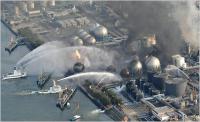
It has been five years since the emergency sirens sounded at Japan’s Fukushima Daiichi power plant following the massive 2011 earthquake and subsequent devastating tsunami. The partial meltdown of three reactors caused approximately 170,000 refugees to be displaced from their homes, and radiation releases and public outcry forced the Japanese government to temporarily shut down all of their nuclear power plants. On the fifth anniversary of the partial meltdown at Japan’s Fukushima Daiichi Power Plant, Stanford’s Rodney Ewing says we should rethink our language, reassess natural disaster risks, and appreciate the links between nuclear energy and renewables.
-
-
Are America's cities prepared for extreme weather events?
Infrastructure is, by design, largely unnoticed until it breaks and service fails. It is the water supply, the gas lines, bridges and dams, phone lines and cell towers, roads and culverts, train lines and railways, and the electric grid; all of the complex systems that keep our society and economy running. Engineers typically design systems to withstand reasonable worst-case conditions based on historical records; for example, an engineer builds a bridge strong enough to withstand floods based on historical rainfall and flooding. But what happens when the worst case is no longer bad enough?
-
-
Bird droppings caused N.Y. nuclear reactor power outage

On 14 December, one of the nuclear reactors at Indian Point nuclear power plant outside New York City was safely shut down for three days, following an electrical disturbance on outdoor high voltage transmission lines. Outside experts investigating the incident found the bird droppings were the cause of the electrical disturbance.
-
-
2014 French nuclear accident more serious than official reports suggested
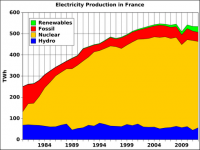
German media charges that the French nuclear authority and the French company operating the aging Fessenheim nuclear facility in France, concealed the seriousness of the April 2014 incident at the site. The French nuclear authorities withheld information not only from the German government, but also from the IAEA, to which they were required to submit a detailed report about the incident.
-
-
Resources used for biofuel reduce resources available for food production
As strategies for energy security, investment opportunities and energy policies prompt ever-growing production and consumption of biofuels like bioethanol and biodiesel, land, and water that could otherwise be used for food production increasingly are used to produce crops for fuel. A new study shows about a third of the world’s malnourished population could be fed by using resources now used for biofuel production.
-
-
Groundwater deficit growing in important western U.S. aquifers
By 2050, climate change will increase the groundwater deficit even more for four economically important aquifers in the Western United States, a new report says. Groundwater deficits are expected to worsen in four important aquifers, creating a precarious balance between usage and recharge. The new report is the first to integrate scientists’ knowledge about groundwater in the American West with scientific models that show how climate change will affect the region.
-
-
Mosul dam could collapse at any time, killing 1m people: Engineers
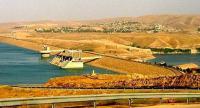
Iraqi civil engineers familiar with the Mosul dam are warning of the dam’s imminent collapse, saying that the consequent death toll would likely be worse than earlier estimated. The engineers warned that the loss of life from a sudden collapse of the Mosul dam could be higher than earlier official estimates of 500,000, as many people could perish in the resulting mass panic. If the dam collapses, a 20-metre-high flood wave would hit the city of Mosul, then roll on down the Tigris valley through Tikrit and Samarra all the way to Baghdad.
-
-
Water storage strategies in Sub-Sahara Africa
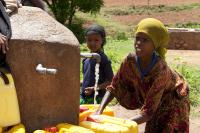
Direct abstraction of water from rivers through ponds and pumping devices seems the most attractive water storage option in Ethiopia. However, the funding agencies that may be interested in investing in such a storage system have to consider that better access to credit, and clear abstraction policies should be ensured.
-
-
Air data can be used to reconstruct radiological releases
New research demonstrates that experts can use data from air sampling technology to not only detect radiological releases, but to accurately quantify the magnitude and source of the release. This has applications for nuclear plant safety, as well as national security and nuclear nonproliferation monitoring.
-
-
Using device “fingerprints” to protect power grid, industrial systems
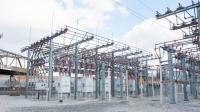
Human voices are individually recognizable because they are generated by the unique components of each person’s voice box, pharynx, esophagus and other physical structures. Researchers are using the same principle to identify devices on electrical grid control networks, using their unique electronic “voices” — fingerprints produced by the devices’ individual physical characteristics — to determine which signals are legitimate and which signals might be from attackers. A similar approach could also be used to protect networked industrial control systems in oil and gas refineries, manufacturing facilities, wastewater treatment plants and other critical industrial systems.
-
-
Calculating monetary losses from floods caused by sea level rise
Damages from extreme events like floods are even more relevant than the mean sea level itself when it comes to the costs of climate impacts for coastal regions. However, while it is now rather well understood how sea-levels will rise in the future, only small progress has been made estimating how the implied damage for cities at the coasts will increase during the next decades. Scientists now provide a method to quantify monetary losses from coastal floods under sea-level rise. For the first time, the scientists show that the damage costs consistently increase at a higher rate than the sea-level rise itself.
-
-
WikiLeaks list not connected to terrorist attacks

The WikiLeaks organization was criticized for providing a target list for terrorists when it published a secret memo in 2010 with 200 international sites that the U.S. Department of Homeland Security considered critical to national security. Was there any truth to that claim?
-
-
Chlorine-free water tastes better, and may be healthier

Chlorinated tap water is the norm around the world, but the experiences of several European countries is that it does not have to be. The benefits of foregoing chlorine include better-tasting and, potentially, healthier water.
-
-
Calif. gas well blowout caused U.S. largest methane release, study finds
The Aliso Canyon natural gas well blowout released more than 100,000 tons of the powerful greenhouse gas methane before the well was finally plugged 11 February, according to the first study of the event. The results confirm that it was the largest methane leak in U.S. history.
-
- All
- Regional
- Water
- Biometrics
- Borders/Immig
- Business
- Cybersecurity
- Detection
- Disasters
- Government
- Infrastructure
- International
- Public health
- Public Safety
- Communication interoperabillity
- Emergency services
- Emergency medical services
- Fire
- First response
- IEDs
- Law Enforcement
- Law Enforcement Technology
- Military technology
- Nonlethal weapons
- Nuclear weapons
- Personal protection equipment
- Police
- Notification /alert systems
- Situational awareness
- Weapons systems
- Sci-Tech
- Sector Reports
- Surveillance
- Transportation
Advertising & Marketing: advertise@newswirepubs.com
Editorial: editor@newswirepubs.com
General: info@newswirepubs.com
2010-2011 © News Wire Publications, LLC News Wire Publications, LLC
220 Old Country Road | Suite 200 | Mineola | New York | 11501
Permissions and Policies
Editorial: editor@newswirepubs.com
General: info@newswirepubs.com
2010-2011 © News Wire Publications, LLC News Wire Publications, LLC
220 Old Country Road | Suite 200 | Mineola | New York | 11501
Permissions and Policies
